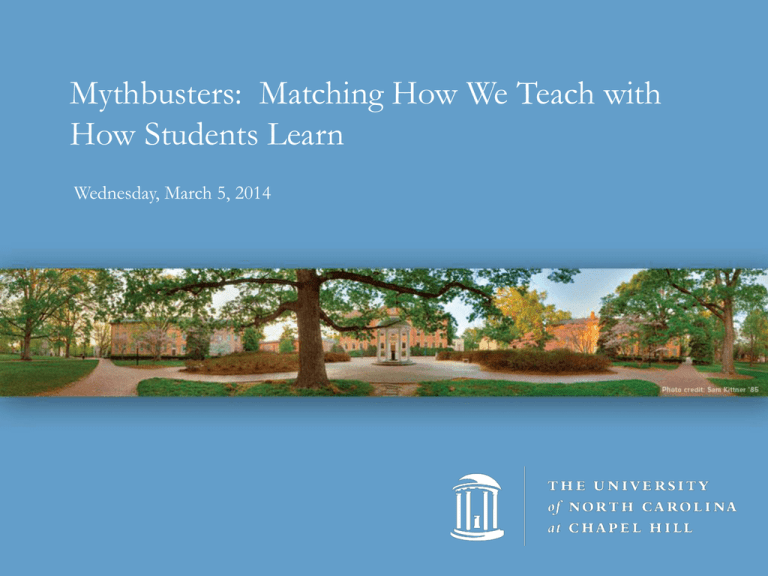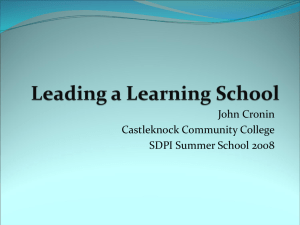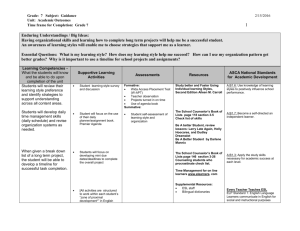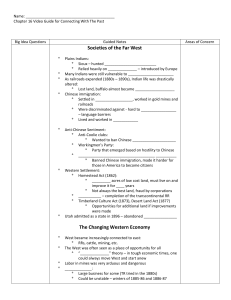Mythbusters: Matching How We Teach with How Students Learn
advertisement

Mythbusters: Matching How We Teach with How Students Learn Wednesday, March 5, 2014 Who We Are • School of Education: Educational Psychology Measurement and Evaluation Program – William P. Jackson, Doctoral Student – Seung B. Yu, Doctoral Student – Jeffrey A. Greene, Associate Professor Agenda • Explore: Learning myths • Share: Pedagogy for life-long learners • Implement: Finding solutions for challenges But First we need Volunteers! • One volunteer who can roll with the punches and is an auditory learner • One volunteer who is a GPS Wiz We’re not in Kansas Anymore! Explore: Learning Styles Search for learning styles… • …comes from a wonderful place • Differentiation! Learning ≠ Styles Pashler et al. (2009) and Kirschner & van Merrienboer (2013) Unnecessarily Limiting Instruction should focus on helping students create meaning Please Don’t Explore: Digital Natives Today’s students are “different” The Myth • Digital natives’ extensive use of computers has rewired their brains. “It is very likely that our students’ brains have physically changed – and are different from ours – as a result of how they grew up.” “But whether or not this is literally true, we can say with certainty that their thinking patterns have changed.” - Prensky (2001) Digital Natives “Need”… • • • • • • • Fast delivery of information Parallel processes and multitasking Graphics before text Random access to information (hypertext) Networking Instant gratification and frequent rewards Games, not “serious work” Digital Native Technology Use • • • • Majority own computers and phones Used for word processing, emailing, surfing Less than 25% engaging in content creation Few show ability to effectively search for, and critically evaluate, information on the web • *More research is needed Are Digital Natives Disenchanted with Traditional Education? • No more than students in the past • They understand difference between school and home Internet use • Lack ability to use Internet to learn academic content Digital Natives are not Homogeneous • Differences in technology knowledge, skills, ownership, and use by: – SES – Cultural/ethnic background – Gender – Discipline/major – Family dynamics • *More research is needed Why are people infatuated with “Digital Native” Idea? • Moral panic: the public discourse about a topic may not be supported by evidence, yet still proliferate – Rhetoric – Appeals to common sense – Compelling anecdotes – Blaming the “experts” (i.e., teachers, educators) Critique • Where’s the evidence? • How well do these claims align with what we know about cognition, motivation, instruction, and learning? • Is there anything new here? • (Bennett et al., 2008) So What Do Digital Natives Need? • Guidance on how to … – Comb thru all the info available via the internet – Use information available to develop deep understanding – Reflect on and identify those learning strategies that work best for them Explore: Self-Regulated Learning Teaching students how to learn as opposed to teaching content… Self-Regulated Learners… • Clearly define tasks • Make plans constructed of specific learning criteria • Monitor effectiveness of enacted strategies • Reflect on how they learn A Cycle of Self-Regulated Learning Planning Use Strategy Use Strategies Monitoring Adapt References: Azevedo et al., 2008; Zimmerman, 2002 Planning, Strategy Use & Monitoring Planning Strategy Use Monitoring Planning Strategy Use Monitoring ? ? ? Planning & Forethought • Orienting to the task and accessing prior knowledge • Assessing gap between prior knowledge and stated learning goals • Creating learner specific goals • Identifying an overall learning plan Strategy Use & Performance • Maintaining focus on set learning goals • Corroborating that learned ideas are accurate • Coordinating multiple sources of information Strategy Use & Performance • Comparing & Contrasting information • Elaborating on information learned • Making connections to solidify newly learned ideas *strategies can be very domain specific (e.g., historical perspective taking, establishing chronology) Monitoring & Control • Select relevant resources • Check and be aware of understanding or lack of it • Delayed, full recall when predicting future assessment performance • Track effectiveness of strategies used • Make changes when needed Planning, Strategy Use & Monitoring Planning Strategy Use Monitoring Orient to the task Corroborate Sources Pick useful information Check Knowledge Gaps Coordinate Information Sources Check Progress Check learning Set Goals Make connections Control your learning Identify a general approach Compare & Contrast Elaborate Time Planning Share: How Do You Promote SRL? Teaching Planning • Why might planning be especially important for students learning from the internet? • Learners need clear goals to maintain task focus • Learners with out clear and appropriate goals run the risk of gaining irrelevant knowledge Teaching Planning • Share examples where you have seen teachers giving students an opportunity to plan. • What type of lesson goals allow students to make effective and appropriate plans? How to match Teaching to SRL… • Modeling is key • Allowing students to make mistakes so they can self-correct with assistance • Making sure scaffolding includes fading • Explicit but couched in real learning task Shifting Roles of Pedagogy • Provide examples of how you’ve seen teachers effectively shift from a deliverer of knowledge to a guide illuminating the path to knowledge? • Examples of setting the stage for modeling • Talk about excellent examples of scaffolding and fading you have seen Helping Students to become more aware • Increasing students knowledge about verified research related to learning • Giving them opportunities to be more aware of those learning behaviors that work best for them Promoting Self-Knowledge • Examples of instances where teachers have done a good job of helping students understand how they learn best • Examples of good reflection activities that promote student knowledge of their own learning • Promoting the use of full knowledge recall when self-testing Implement: Anticipate Challenges & Circumvent If It Were Easy… • What are the challenges of creating learning environments that foster SRL? • Come to a consensus about those which will be the most difficult to over come • Think of this as an FAQ list Solution Share • Share challenges • Find solutions In Sum • • • • Learning styles are too limiting Today’s students aren’t “digital natives” Students need help self-regulating Students need opportunity and support to learn SRL skills References • Bennett, S., Maton, K., & Kervin, L., (2008). The ‘digital natives’ debate: A critical review of the evidence. British Journal of Educational Technology, 39(5), 775-786. • Kirschner, P. A., & van Merrienboer, J. J. G. (2013). Do learners really know best? Urban legends in education. Educational Psychologist, 1-15. • Pashler, H., McDaniel, M., Rohrer, D., & Bjork, R. (2009). Learning styles: Concepts and evidence. Psychological Science in the Public Interest, 9(3), 105-119. • Willingham, D. T. (2010, Summer). Have technology and multitasking rewired how students learn? American Educator, 23-28.


